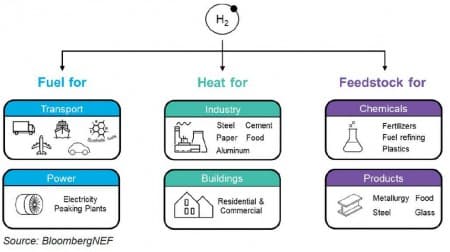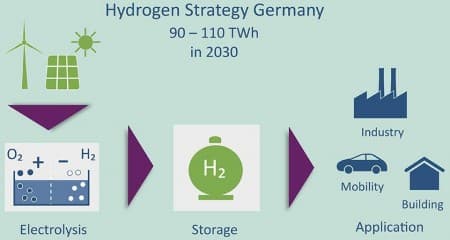Decarbonization and the energy transition used to be a topic for environmentalists and leftist politicians. Not so long ago photovoltaic cells and wind turbines were produced on a limited scale. In recent years, however, a remarkable shift has occurred where renewables have become increasingly competitive, and in regions with favorable conditions, even cheaper than conventional power plants. German politicians have become aware of the economic potential and are about to unleash the country’s formidable industrial resources towards the development of hydrogen-related technologies.
The turning point
The green movement has historically been strong in Germany. Despite its strength, external developments have accelerated an ongoing process. The ‘Energiewende’ or energy transition strategy was approved in 2010, but the nuclear disaster of Fukushima sped up the phasing out of coal and nuclear power. In recent years a massive amount of wind turbines and solar panels have been installed across the country. In 2019 renewables made up to 46 percent of the country’s electricity production.
Decarbonization of electricity production, however, is the first and relatively easy part of the energy transition. The majority of the world’s energy consumption is based on molecules instead of electrons meaning primarily oil and gas. The industry needs an awful lot of energy for high-temperature appliances which cannot be replaced by electricity. Hydrogen could be a solution.
The global attention for hydrogen can be explained by its versatility. The H2 molecule seems to be the holy grail of the energy sector because it links many appliances within the value chain. Hydrogen can be produced through the process of electrolysis, which can be used to produce synthetic kerosene. In its original form, it can also power vehicles containing a fuel cell in a co-called fuel cell electric vehicle (FCEV). Related: IEA: The Energy Sector Will Never Be The Same Again

The Germans have woken up to hydrogen's potential due to several factors. First, the availability of large quantities of cheap electricity due to the installment of wind turbines and solar panels improves the business case for green hydrogen. Second, Germany requires green hydrogen to decarbonize its industry. Thirdly, Berlin is aware of the watershed moment and the potential to become a global powerhouse for hydrogen-related technologies. Therefore, policymakers recently unveiled a €9 billion (approximately $10.2 billion) economic stimulus package to kick-start the hydrogen economy.
Playing catch up
Berlin doesn't only intend to become a hub for hydrogen-related technologies, but Europe's foremost industrial country aims to become the world's leading hydrogen power. Several Asian countries have been investing in their hydrogen economy for years. Primarily Japan and South Korea have a strong track record.
Tokyo and Seoul were not only motivated by economic reasons, but the countries’ bad luck concerning the availability of natural recourses has induced them to develop alternative tecchnologies. The two Asian countries are some of the world’s biggest buyers of oil, coal, and natural gas. Japan’s import dependence even stands at an incredible 93 percent. Hydrogen could offer an opportunity to strengthen energy security by decreasing import dependence.
Before the novel Coronavirus outbreak, Tokyo intended to put the country's hydrogen technology capabilities in the spotlight by dubbing the 2020 Tokyo Olympic Games as “the Hydrogen Games”. The South Korean hydrogen strategy has motivated its auto industry to take advantage of the opportunity. Korea’s Hyundai Motor is increasing investments in FCEV and the necessary infrastructure.
Germany’s €9 billion bet
The looming economic crisis offers opportunities to the German federal government. The countries financial stimulus package is one of the biggest in the world both in absolute and relative numbers. Berlin announced it will be spending €130 billion. Furthermore, the sum of all measures adds up to a whopping 30 percent of the country’s GDP which is one of the highest in the world. This includes €7 billion for the ramp-up of hydrogen technologies and €2 billion for international partnerships. Related: Asian Oil Markets Tighten After Saudi Aramco Cuts Supply
The strategy intends to increase green hydrogen production to 5 GW by 2030 and an additional 5 GW for the period until 2035. This should lead to the rapid growth of hydrogen production and consumption where Germany’s central position in Europe could kickstart supply chains across the continent.

Before the strategy's publication, German pipeline operators already presented plans for the world’s largest hydrogen grid. The 1,200 km grid could be ready by 2030 and would cost $715 million. German companies, in the meantime, are not sitting idle. Energy giant RWE, for example, is developing a 100 MW electrolyzer to produce green hydrogen for a steel mill.
The right framework
While German policymakers can be accredited with having ambitious goals, innovations and investments eventually are made by the private sector. However, Berlin is laying down the right framework for the rapid development of hydrogen technologies. The coherent and broad strategy is not solely ‘Germany-focused’ as Berlin intends to make hydrogen a top priority for its 6-months chairmanship of the European Council starting in July.
Already transnational cooperation frameworks are unfolding. The Dutch and German Ministries of Economic Affairs and Germany's largest state, North Rhine-Westphalia, are looking into the option to transport green hydrogen produced by offshore wind turbines and transported through existing infrastructure in the Netherlands.
It is a far to early, but Berlin’s ambitious strategy comes at the right moment to provide the German industry with the impetus to invest in future technologies.
By Vanand Meliksetian for Oilprice.com
More Top Reads From Oilprice.com:
- Midstream Oil Companies Are Beginning To Feel The Pinch
- UN Report Links Iran To Attacks On Saudi Oil Tankers
- The Cowboy State Is Hurting As Low Oil Prices Persist

















